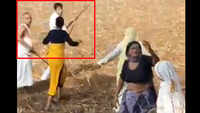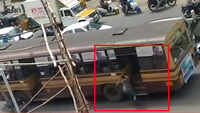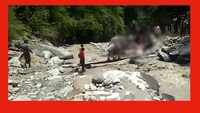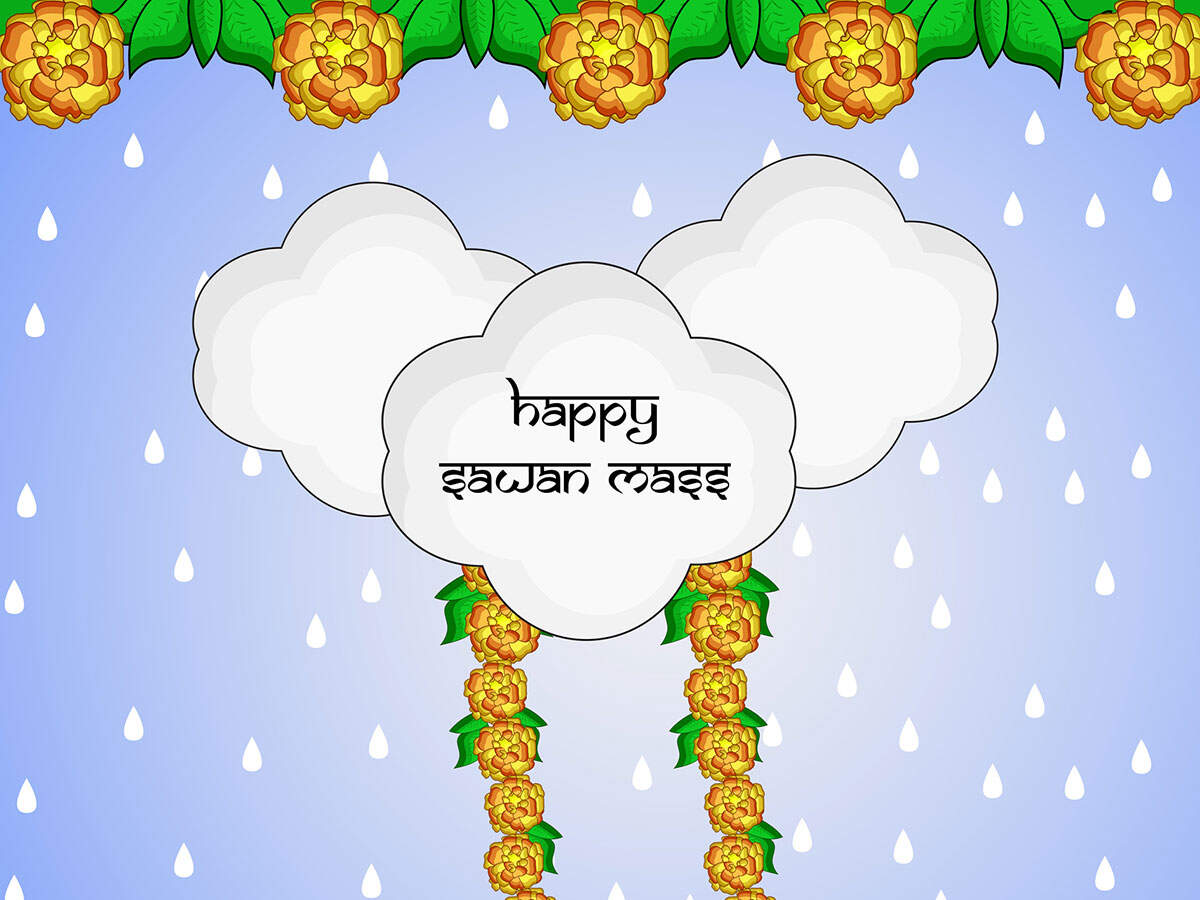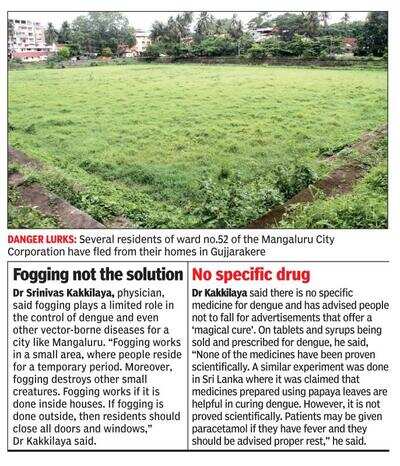
Mangaluru: Gujjarakere, a tank with a history of over 1,800 years is at the centre of the dengue outbreak in the city. On the brighter side: this scare may see the revival of the lake with locals demanding the tank be desilted.
P Nemu Kottari, secretary, Gujjarakere Thirtha Samrakshana Vedike, said, “We have been fighting for the revival of Gujjarakere since a decade. We told authorities that the area is prone to malaria and dengue, but they never took us seriously. The administration feels Gujjarakere may not be responsible for the dengue outbreak, but if those living near the lake are affected, there has to be a connection, isn’t it?,” he questioned.
The core areas affected are Gorakshana Dandu, Arakerebail, Aleman compound, Mulihithlu, Bolar, Hoige Bazaar, Onikere, Jeppu Market and Mahakalipadpu. “We submitted a memorandum to the DC, MLA and MCC commissioner before monsoon requesting them to take suitable measures. The drainage system in the area is pathetic. But no one took us seriously,”rued Kottari.
Nandan Shetty, resident of Bolar, who is being treated at a private hospital for dengue, said, “had the authorities taken up measures on time, the outbreak could have been surely controlled. Dengue was first reported from a colony in Mahakalipadpu and spread to other areas,” he said.
Meanwhile, in a colony near Jeppu at least 19 people from 10 houses have been hospitalized with fever. Renni, another resident, said that sanitizing of the areas was taken up too late.
Water not potable
Water samples from Gujjarakere were found to be unfit for drinking. The department of aquatic animal health management, College of Fisheries in its report has confirmed presence of abnormal fecal coliform count.
426 dengue cases in DK
Thirty more suspected dengue cases were reported from various hospitals in the district on Monday. On Sunday, the health department recorded 426 confirmed dengue cases (Jan-July). The highest number of dengue cases has been reported in Mangaluru taluk.
Focus on high-risk areas : MCC commissioner Mohammed Nazeer said the corporation has prepared an action plan to control dengue and malaria cases. Teams are spreading awareness to check presence of larva in stagnant water in Gujjarakere, Kodialbail, Mulihithlu, Mangaladevi, Bolar, Kadri and surrounding areas where large number of dengue cases are reported.
Fogging not the solution
Dr Srinivas Kakkilaya, physician, said fogging plays a limited role in the control of dengue and even other vector-borne diseases for a city like Mangaluru. “Fogging works in a small area, where people reside for a temporary period. Moreover, fogging destroys other small creatures. Fogging works if it is done inside houses. If fogging is done outside, then residents should close all doors and windows,” Dr Kakkilaya said.
No specific drug
Dr Kakkilaya said there is no specific medicine for dengue and has advised people not to fall for advertisements that offer a ‘magical cure’. On tablets and syrups being sold and prescribed for dengue, he said, “None of the medicines have been proven scientifically. A similar experiment was done in Sri Lanka where it was claimed that medicines prepared using papaya leaves are helpful in curing dengue. However, it is not proved scientifically. Patients may be given paracetamol if they have fever and they should be advised proper rest,” he said.
Awareness in schools: The administration has decided to reach out to school students and check breeding spread of mosquito larva at homes. MCC joint commissioner Gayathri Nayak said students will be asked to take a pledge and get a note signed by parents that there are no mosquito breeding points in their homes and surroundings.
SYMPTOMS:
High fever
Body and joint pain
Frontal headache (near the forehead and behind the eyes)
Blood clot stains on skin
Bleeding from mouth, nose and gums
Nausea and vomiting
P Nemu Kottari, secretary, Gujjarakere Thirtha Samrakshana Vedike, said, “We have been fighting for the revival of Gujjarakere since a decade. We told authorities that the area is prone to malaria and dengue, but they never took us seriously. The administration feels Gujjarakere may not be responsible for the dengue outbreak, but if those living near the lake are affected, there has to be a connection, isn’t it?,” he questioned.
The core areas affected are Gorakshana Dandu, Arakerebail, Aleman compound, Mulihithlu, Bolar, Hoige Bazaar, Onikere, Jeppu Market and Mahakalipadpu. “We submitted a memorandum to the DC, MLA and MCC commissioner before monsoon requesting them to take suitable measures. The drainage system in the area is pathetic. But no one took us seriously,”rued Kottari.
Nandan Shetty, resident of Bolar, who is being treated at a private hospital for dengue, said, “had the authorities taken up measures on time, the outbreak could have been surely controlled. Dengue was first reported from a colony in Mahakalipadpu and spread to other areas,” he said.
Meanwhile, in a colony near Jeppu at least 19 people from 10 houses have been hospitalized with fever. Renni, another resident, said that sanitizing of the areas was taken up too late.
Water not potable
Water samples from Gujjarakere were found to be unfit for drinking. The department of aquatic animal health management, College of Fisheries in its report has confirmed presence of abnormal fecal coliform count.
426 dengue cases in DK
Thirty more suspected dengue cases were reported from various hospitals in the district on Monday. On Sunday, the health department recorded 426 confirmed dengue cases (Jan-July). The highest number of dengue cases has been reported in Mangaluru taluk.
Focus on high-risk areas : MCC commissioner Mohammed Nazeer said the corporation has prepared an action plan to control dengue and malaria cases. Teams are spreading awareness to check presence of larva in stagnant water in Gujjarakere, Kodialbail, Mulihithlu, Mangaladevi, Bolar, Kadri and surrounding areas where large number of dengue cases are reported.
Fogging not the solution
Dr Srinivas Kakkilaya, physician, said fogging plays a limited role in the control of dengue and even other vector-borne diseases for a city like Mangaluru. “Fogging works in a small area, where people reside for a temporary period. Moreover, fogging destroys other small creatures. Fogging works if it is done inside houses. If fogging is done outside, then residents should close all doors and windows,” Dr Kakkilaya said.
No specific drug
Dr Kakkilaya said there is no specific medicine for dengue and has advised people not to fall for advertisements that offer a ‘magical cure’. On tablets and syrups being sold and prescribed for dengue, he said, “None of the medicines have been proven scientifically. A similar experiment was done in Sri Lanka where it was claimed that medicines prepared using papaya leaves are helpful in curing dengue. However, it is not proved scientifically. Patients may be given paracetamol if they have fever and they should be advised proper rest,” he said.
Awareness in schools: The administration has decided to reach out to school students and check breeding spread of mosquito larva at homes. MCC joint commissioner Gayathri Nayak said students will be asked to take a pledge and get a note signed by parents that there are no mosquito breeding points in their homes and surroundings.
SYMPTOMS:
High fever
Body and joint pain
Frontal headache (near the forehead and behind the eyes)
Blood clot stains on skin
Bleeding from mouth, nose and gums
Nausea and vomiting
World Cup 2019
Trending Topics
LATEST VIDEOS
More from TOI
Navbharat Times
Featured Today in Travel
Quick Links
Lok Sabha Election Schedule 2019Lok Sabha Election NewsDelhi Capitals teamMI team 2019Rajasthan Royals 2019RCB team 2019Maharashtra Lok Sabha ConstituenciesBJP Candidate ListBJP List 2019 TamilnaduShiv Sena List 2019AP BJP List 2019Mamata BanerjeeBJP List 2019 MaharashtraPriyanka GandhiBJP List 2019 KarnatakaAMMK Candidate List 2019BJP List 2019 WBLok Sabha Elections in Tamil NaduBSP List 2019 UPNews in TamilLok Sabha Poll 2019Satta Matka 2018PM ModiMahagathbandhanNagpur BJP Candidate ListChandrababu NaiduTamil Nadu ElectionsUrmila MatondkarNews in TeluguMadras High CourtTejashwi YadavArvind KejriwalTejasvi SuryaPawan KalyanArvind KejriwalYogi AdityanathJaya PradaSatta King 2019Srinagar encounter
Get the app

